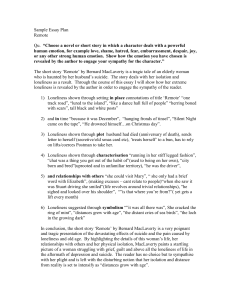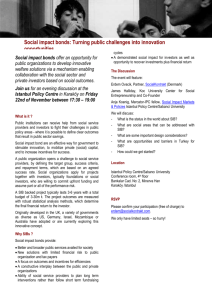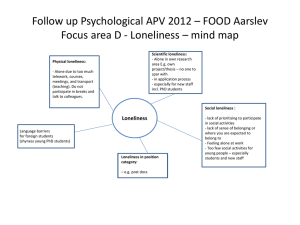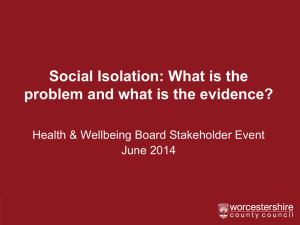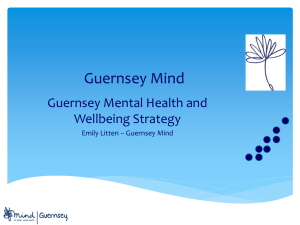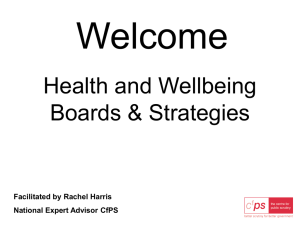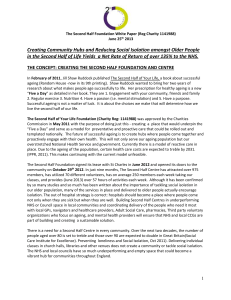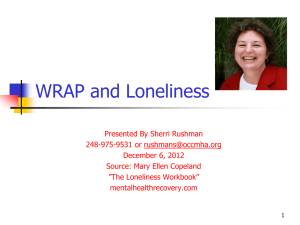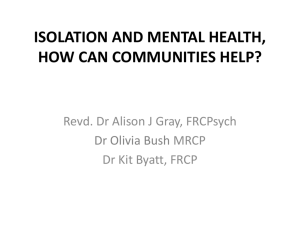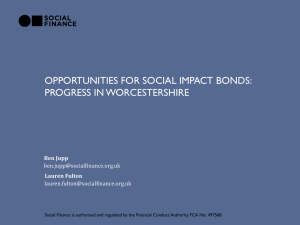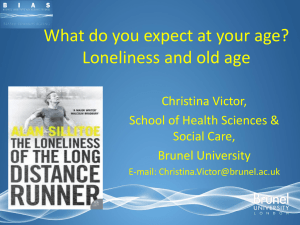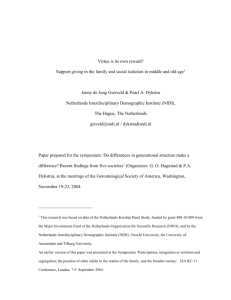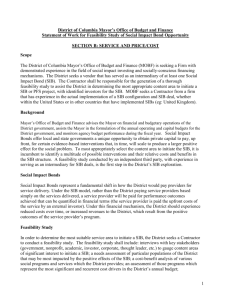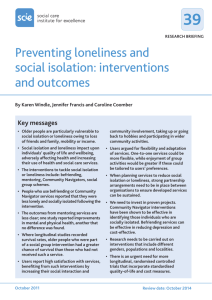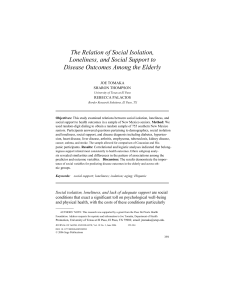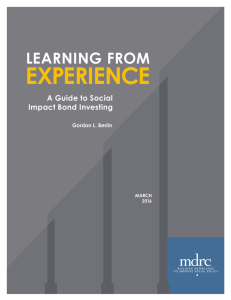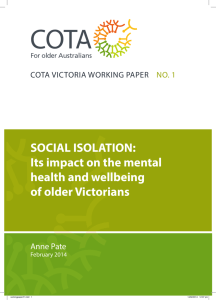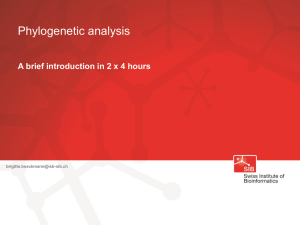Richard Todd (Social Finance)
advertisement
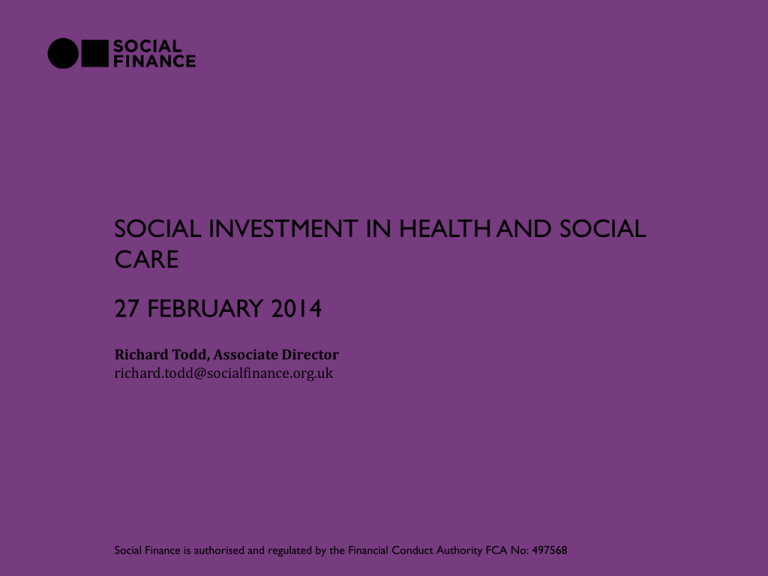
SOCIAL INVESTMENT IN HEALTH AND SOCIAL CARE 27 FEBRUARY 2014 Richard Todd, Associate Director richard.todd@socialfinance.org.uk Social Finance is authorised and regulated by the Financial Conduct Authority FCA No: 497568 WHAT DO WE DO? 2 Social Finance works with government, social ventures and investors to unlock financial barriers and help drive social change. Change the way government seeks to tackle problems We create financial structures and implement programmes that bring stable and sustainable funding to organisations dealing with social issues Help build and support growth of strong, effective social enterprises Expand the range of investors able to participate in social investment ©Social Finance 2014 DELIVER SUSTAINABLE AND SCALABLE SOCIAL CHANGE COULD SOCIAL INVESTMENT HELP TRANSFORM HEALTH AND SOCIAL CARE? Despite the scale of spending in these sectors, there remain areas where radical improvement is needed yet traditional financial structures have been unable to effectively meet this need. Challenge Potential value of social investment Funding on the basis of historical activity, not new opportunities Flexibility to deploy capital unrestricted by existing structures and outside of traditional annual budget cycles Investment in R&D and ‘mainstream’ services, not the roll-out of new practice Ability to provide risk capital to fund the expansion of services Variable implementation of preventative and complex programmes Stimulates a focus on performance management to protect investment Grants are precious resources, yet can only be used once and do not always lead to financially sustainable change Resources can be re-cycled once investment repaid, sustainability central to approach ©Social Finance 2014 3 SOCIAL INVESTMENT MAY ENABLE THE SOCIAL SECTOR TO SCALE UP Charities and social enterprises are already providing valuable services to the NHS, but these are often small and at the margin of core services. • An analysis of a sample of 2012/13 community health contract awards by provider type1 illustrates the issue. • Anecdotal evidence suggests that financial barriers remain for third sector providers in winning core service contracts, creating an uneven playing field for these organisations to compete for the larger contracts won by the private sector and NHS Foundation Trusts. Number of contracts won by organisation type Average value of contracts won by organisation type 2 1 Survey of contracts awarded in 2012/13 identified as with the search term “community health” as detailed on UK health procurement portals (primarily http://www.supply2health.nhs.uk/default.aspx and http://www.publictenders.net/). NB: Primary Care 2014 Trusts were abolished March 2013 as part of the NHS reforms. Some of the services which were previously managed by local PCT will be transferred to Clinical ©Social Finance Commissioning Groups (CCGs), 4 SOCIAL INVESTMENT CAN BE DEPLOYED IN DIFFERENT WAYS 5 Segmentation is already developing around the role that social investment is asked to perform, the risks that social investors take and the complexity of new models. Greater complexity / greater impact Financing for expansion from socially-motivated partners Support for due diligence rigour Investment in management systems and infrastructure Whole pathway redesign New delivery models New contract models Integration of services Funding social enterprises to expand or enhance activity Funding for whole system or pathway change Examples • Avante Care Partnership • Shared Lives Incubator • Care and Share Associates Examples • A SIB to fund enhanced community end-of-life care provision • Social isolation SIB Commissioner change required • Variable – potential contractual expansion, flexibility around delivery and funding model Commissioner change required • High – will have key role in reorganising whole system of care provision Provider change required • Variable – potential expansion of service offering (scope or scale), investment readiness work Provider change required • High – likely to require degree of coordination, integration and management above providing established service ©Social Finance 2014 SOME OF THE AREAS ACROSS HEALTH AND SOCIAL CARE IN WHICH WE ARE WORKING TODAY 6 Social isolation and self-care for long-term health conditions SIB A SIB to fund scaling of community volunteer resources to support those with long-term health conditions A SIB to fund enhanced community end-of-life care provision National expansion of Shared Lives social care Support for a community health mutual to raise investment in services Developing a social investment strategy across health and social care for a local authority A care and wellbeing social investment fund Better aligning services across health and employment Working with a group of Almshouses to invest in new extracare housing ©Social Finance 2014 APPENDICES ©Social Finance 2014 7 8 EXAMPLE: REDUCING SOCIAL ISOLATION AND LONELINESS IN WORCESTERSHIRE An ageing population, the changing nature of community and family life, and significant NHS and local government budget pressures together require health and social care commissioners to think innovatively about how to help maintain people’s health and develop new models of care. Loneliness and social isolation are now recognised as one of the key determinants of health and well-being among older people but are historically under-invested in and poorly addressed. • Social Finance’s analysis suggests that effective programmes to reduce loneliness and isolation can deliver significant value for individuals and the health and care system as a whole. • However, previous experience suggest that it can be difficult to design and deliver effective services. Many fail. • This is therefore an area where commissioning differently – on the basis of outcomes – could have a significant advantages. A Social Impact Bond could transfer the risk of service implementation to social investors and allow the commissioners to pay only if loneliness is decreased across a population of older adults. Outline approach INVESTORS Payments on basis of outcomes Funding Lead delivery organisation Befriending Group Activity and Exercise CBT for most isolated Reduced loneliness ©Social Finance 2014 Commissioners - CCGs, Local authorities, central government Reduction in loneliness Peer support groups SOCIAL FINANCE HAS UNDERTAKEN MODELLING TO BETTER ASSESS THE COSTS OF LONELINESS Social Finance has modelled some of the short and medium term health and social care value associated with long-term conditions developed as a result of loneliness. Total value will be higher. ©Social Finance 2014 9 EXAMPLE: THE CARE AND WELLBEING FUND 10 Social Finance is developing a £20+m proof of concept social investment fund focused on health and social care – the Care and Wellbeing Fund. Our aim is to serve both a wider range of investors and delivery organisations. Through this we hope to catalyse delivery of impact and financial returns. The Fund’s objective is: ‘To improve health and wellbeing in the UK with particular focus on disadvantaged groups such as the frail elderly, those with a long-term health condition and those with a disability. The Fund aims to support, with investment, the growth of ambitious charities, social enterprises and ventures which deliver improved wellbeing. The focus will be on prevention, early intervention and community-based solutions.’ Investment Strategy Risk capital: • to support growth and development of social enterprises and social purpose businesses • to generate defined and measurable impact •which is a form of repayable funding Key Themes • Ageing and long term conditions • Disability • Health improvement • Health and employment • Service innovation A strongly mission-driven fund, seeking to attract socially motivated investment with cornerstone funding from Big Society Capital matched by co-investors ©Social Finance 2014 IMPACT FRAMEWORK 11 The Fund will target specific investment themes and will have a defined framework for assessing and measuring social impact results Fund Themes 1. Ageing & Long term conditions 2. Disability 3. Health improvement 4. Health & employment 5. Wider innovation Direct Impacts* A. Improved health & wellbeing e.g. delaying onset of ill-health and recovery from ill-health B. Reduced health & economic inequalities e.g. greater access to services and employment for economically disadvantaged groups C. Greater independence & dignity e.g. improved feelings of independence, control & life satisfaction System Impacts* D. Replicable/scalable approach e.g. scope for widespread adoption E. Building capacity of local health & social care system e.g. supports local service integration F. Improving financial sustainability of health & social care system e.g. greater value for money than current practice * We will target investments that meet three of the impact criteria including both direct and system impacts. ©Social Finance 2014 12 THANK YOU ©Social Finance 2014

